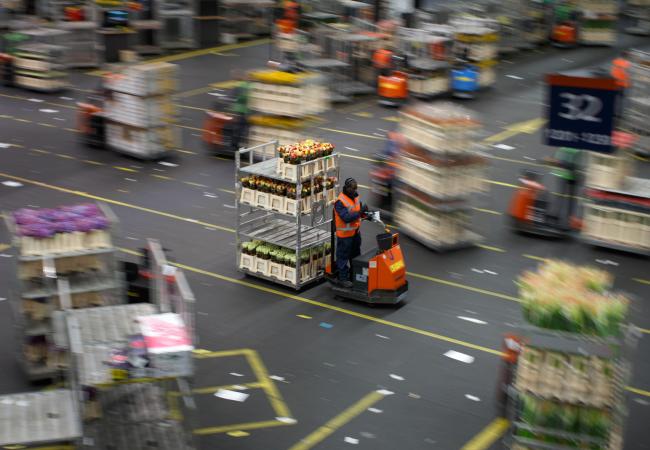(Bloomberg) -- Global economic growth is poised to pick up this year, though the alarm bells about trade are getting louder.
That’s the backdrop for central bankers and finance ministers from the Group of 20 nations who gather July 21-22 in Buenos Aires. It’s the first meeting of the club that oversees 85 percent of the world economy since President Donald Trump imposed tariffs on China and the European Union, sparking retaliation in the first salvo of a global trade war.
Financiers and business leaders from G-20 nations cautioned about the repercussions of increased protectionism ahead of this weekend’s meetings. U.S. Federal Reserve Chairman Jerome Powell on Tuesday said trade barriers threaten productivity and wages, while BlackRock Inc (NYSE:BLK). boss Larry Fink warned intensifying tensions could spur a broad market downturn.
“Global growth has reached an inflection and tipping point, with signs that the escalating U.S.-China trade war is starting to disrupt business and investment,” said Chua Hak Bin, senior economist at Maybank Kim Eng Research Pte in Singapore.
That disruption hasn’t yet dented global growth, which is poised to pick up to 3.9 percent in 2018 -- the fastest expansion in seven years, according to July forecasts from the International Monetary Fund.
Bigger Concern
The bigger concern is that tit-for-tat tariffs between the U.S. and its trading partners will gnaw at confidence and eventually hurt business investment and consumer spending. For JPMorgan Chase & Co (NYSE:JPM). Chief Executive Officer Jamie Dimon, the tension is so far “affecting psyche more than it is economics,” which can have “unpredictable outcomes.”
The trade war has been building for some time. An early warning sign was the March 2017 G-20 meeting in Germany -- the first for U.S. Treasury Secretary Steven Mnuchin -- when members dropped from the official communique a pledge to avoid protectionism. Mnuchin said at another gathering a year later that the U.S. was “loud and clear” in its message. Trump had announced levies on global steel and aluminum imports just days before.
Since then, the U.S. has slapped tariffs on $34 billion of Chinese imports, with another $16 billion likely to follow and an additional $200 billion under consideration. Beijing has retaliated on $34 billion of U.S. goods, saying it will fight back against any further levies. Separately, the U.S. and EU are in a tit-for-tat battle over American metal tariffs, while Trump has threatened to erect barriers against European cars.
The tariffs are hitting supply chains and boosting prices just as some major economies show signs of decelerating.
China’s gross domestic product grew at the slowest pace since 2016 in the second quarter, while key readings on investment gains and industrial output eased in June. The IMF in its July forecasts cut 2018 growth estimates for the euro area and Japan, cautioning that global output could drop roughly 0.5 percent below its projected level by 2020 if threatened trade barriers become reality.
While the numbers point to modest deceleration, the trade clash with the U.S. has only just begun.
Trade Bellwether
South Korea, considered a bellwether for global trade, is showing signs of strain. June exports fell 0.1 percent from a year earlier, compared with a 2.2 percent gain forecast in a Bloomberg survey, and both the Bank of Korea and finance ministry this month trimmed their growth outlook. The softening in Asian exports is a clear warning sign, said Robert Subbaraman, Singapore-based head of emerging markets economics at Nomura Holdings Inc.
“If this growth cushion starts to give way, as we expect, watch for Asia’s market risk premium to rise more sharply,” he said.
Meanwhile Latin American economies may grow increasingly inward looking, as new governments in Mexico and Brazil are likely to focus on domestic issues rather than regional integration, the IMF’s Western Hemisphere Director Alejandro Werner said Tuesday.
Markets don’t fully reflect concerns that trade tensions will derail global growth. The U.S. S&P 500 stock index has increased 5.3 percent this year, while the STOXX Europe 600 Price Index has slipped just 0.5 percent. The MSCI Emerging Markets Index has dropped 7.6 percent in 2018 after surging 35 percent last year.
Businesses, however, are finding it difficult to ignore the trade tensions. U.S. central bankers say their business contacts are expressing concerns over tariffs, with Federal Reserve Bank of St. Louis President James Bullard reporting “full-throated angst” from companies in his district.
“Businesses are becoming a lot more dissatisfied,” said Nick Wall, portfolio manager at Old Mutual Global Investors. “That might soften the rhetoric. Trump cares about business, cares about the stock market, and this might rein him in a little bit.”
